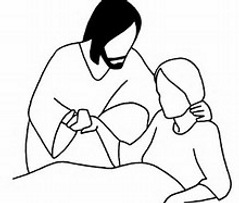THE ANOINTING OF GOD'S TENDERNESS
The sacrament of the sick is offered to us as a concrete sign of God’s concern for those who are sick and suffering in their bodies. Jesus gave the most eloquent example of kindness and devotion to relieve all those who came to him for healing. Today too, in faith in his unconditional love for each and every one of us, let us welcome this sacrament that restores courage and hope.

Echoing the Christian formation workshop of February 4, 2014.
We’ve noticed that this sacrament is little known, and little requested. It is little talked about in our families. The Second Vatican Council changed the ancient meaning of a sacrament called Extreme Unction, which was given at the last moments before death. Today, the sacrament is offered to anyone in need of spiritual support during illness or old age, and can be repeated during the course of the same illness.
The Gospels highlight Jesus’ exceptional concern for the sick and how he healed them. What religious interpretations do we give to physical healings? They illustrate our God’s deep concern for the suffering, and physical healing is like the preamble to spiritual healing, i.e. the discovery of the beneficent love that stimulates us to love and serve. Many of the healings recounted in the Gospels are followed by a commitment on the part of the person. On the other hand, illness isolates the person, who becomes absent from ordinary life. Healing enables them to be reintegrated into the community. Similarly, visiting the sick is of great importance in bringing comfort to the community, through a presence, a word of encouragement, a prayer.
The Catechism of the Catholic Church identifies the expected effects of this sacrament: union with Christ’s Passion, comfort, peace, courage in sickness or old age, forgiveness of sins, restoration of health, if appropriate for spiritual salvation, preparation for the passage to eternal life. Ideally, this sacrament is an opportunity to experience the community’s solidarity with its suffering members. The celebration should be prepared and lived with loved ones who provide emotional and spiritual support. This sacrament can also be experienced during a large Eucharist, enabling sick and aging people to feel enveloped in the goodness of a God who heals bodies and hearts, and gives hope of a life without tears or pain.
